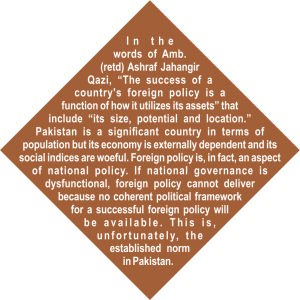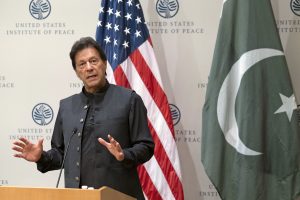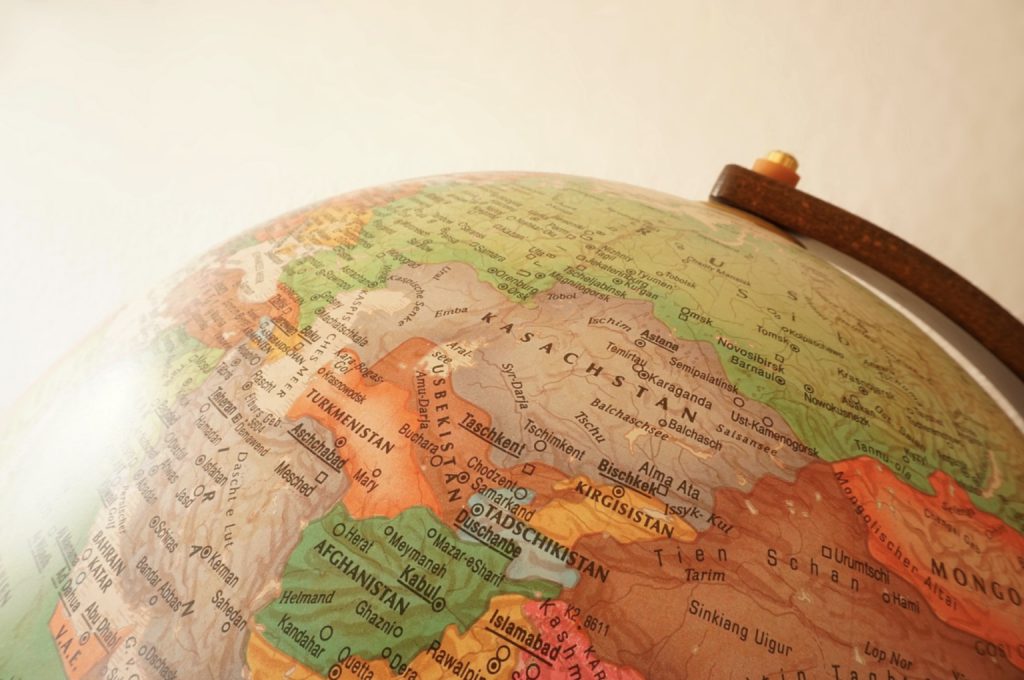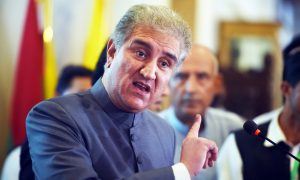Foreign Policy
of Pakistan
Challenges, Opportunities and the Way Forward
Diplomacy is the tool for implementation of foreign policy. Growing inter-dependence, partnerships and cooperation are the imperatives in this age of globalization because economic strength and greater integration can be achieved only if viable global diplomatic outreach is ensured.
 In international relations, there are neither enduring animosities nor friendships; what remains permanent is national interest only. In the 21st century, foreign policy has virtually become a mix of political and economic policies. Pakistan is an important actor in regional and international relations and a pivotal state in the international system, especially in South Asia.
In international relations, there are neither enduring animosities nor friendships; what remains permanent is national interest only. In the 21st century, foreign policy has virtually become a mix of political and economic policies. Pakistan is an important actor in regional and international relations and a pivotal state in the international system, especially in South Asia.
 The geo-strategic location of Pakistan is a real asset for its foreign policy formulators. Pakistan is located at an important junction of South, West and Central Asia. It is a bridge between energy-rich Central Asia and Iran, and energy-hungry countries like China and India. Pakistan provides the shortest land routes to warm waters from Western China to the Arabian Sea, through the Gwadar Port, and oil-rich Gulf and international oil supply lines passing through the Strait of Hormuz. The country links India with Afghanistan and Central Asian Republics (CARs) and provides access to the CARs to the Arabian Sea and India for oil and gas pipelines.
The geo-strategic location of Pakistan is a real asset for its foreign policy formulators. Pakistan is located at an important junction of South, West and Central Asia. It is a bridge between energy-rich Central Asia and Iran, and energy-hungry countries like China and India. Pakistan provides the shortest land routes to warm waters from Western China to the Arabian Sea, through the Gwadar Port, and oil-rich Gulf and international oil supply lines passing through the Strait of Hormuz. The country links India with Afghanistan and Central Asian Republics (CARs) and provides access to the CARs to the Arabian Sea and India for oil and gas pipelines.
The foremost objectives of Pakistan’s foreign policy in the 21st century include: safeguarding the independence, sovereignty, security and territorial integrity of Pakistan. Moreover, protecting national and geostrategic interests, improving internal security, combating terrorism, emphasizing on science and technology and creating a knowledge-based economy are also some important considerations before the country’s foreign policy-makers. Furthermore, respect for sovereignty and territorial integrity of all States, non-interference in the internal affairs of other States and non-aggression are among the cardinal principles of Pakistan’s foreign policy. They also include creating a modern, dynamic, moderate, democratic and progressive Pakistan to engage with the world and promoting political and economic ties and transforming them to partnerships, enhancing solidarity with the Islamic world and Africa, economic diplomacy—to increase exports—foreign direct investments, inflows and focus on trade not aid.
Pakistan should opt for cultural diplomacy and improve its soft image abroad through historical heritage, music, art and cuisine. Promoting public diplomacy and soft power to safeguard Pakistani diaspora’s interests and to foster an equitable international order that is conducive to Pakistan’s faster economic development, social progress and peaceful coexistence is inevitable in the present age of globalization.
Pakistan can also develop as a flourishing transit economy and can become a hub of transit trade through its land, air and water routes. At the present pace of development, Gwadar will stand at par with seaports of Dubai, Singapore, Tehran, Beijing and Washington. For its success, Baloch insurgents must be mainstreamed. The development of Gwadar depends on how the government in Islamabad treats these people. If it does not make a grand bargain with the Baloch, indeed the giant project near the Iranian border would become another lost city in the sand, tormented by local rebellion.
American author and geopolitical analyst Robert D. Kaplan opines: “If the government allows Balochistan to emerge as a region-state under the larger rubric of a democratic and decentralized Pakistan, Gwadar could well give way to a Rotterdam of the Arabian Sea, its highways and pipelines stretching northward to Samarkand.” Indeed, Gwadar can help Pakistan to become a hub of blue economy. Its geostrategic location should be used as an asset instead of taking it as a liability.
Nevertheless, there are certain challenges posed by internal and external factors. The external challenges embrace diverse neighbourhood, complex internal and external security environment, geostrategic location, tyrannical approaches and the revenge of geography, the unending instability in Afghanistan, the protracted stay of Afghan refugees, Daesh’s footprints in Afghanistan, post-NATO withdrawal scenario after May 2021, stalemated relations with India, the Kashmir dispute, India’s sinister designs and her asymmetric military buildup and hostility towards Pakistan.
Moreover, consolidation of ties with Iran, effective and timely completion of all CPEC projects, foolproof security of CPEC and protection of Chinese workers and experts, countering all subversive and terrorist attacks against CPEC projects, carving out rules of business to deal with CPEC projects, expanding economic relations with all countries, especially neighbours, are amongst the various inter-linked challenges before Pakistan.
The foremost internal challenge is almost dysfunctional national governance as institutions are not fully delivering. Due to foreign involvement in its economic policy-making, Pakistan seems to have become less than a sovereign country. The potential of Pakistan is enormous but it has been consistently wasted and is becoming irrelevant. National security is largely fulfilled but it needs an all-time vigilance and preparedness. Moreover, Pakistan’s nuclear program, its capability, continued pressures from the USA and Europe, allegations of proliferation to North Korea and Iran certainly pressurize the policymakers psychologically.
Nonetheless, there are certain opportunities for the foreign policy formulators, i.e. geo-strategic location to be made an asset, CPEC (a real game-changer), shortest route to transport hydrocarbons from Central Asia to outside world and manufactured goods to Asia, the Middle East, Africa and Europe especially through Gwadar Port.
Energy projects under CPEC, industrial parks and special economic zones, CPEC projects that will generate jobs, transit facilities, opportunities in OBOR and BRI, Shanghai Cooperation Organization: another potential stabilizers for peace, security and stability, CASA 1000 would bring surplus electricity from Kyrgyz Republic and Tajikistan to Afghanistan and Pakistan, TAPI gas pipeline would supply natural gas from Turkmenistan to Afghanistan, Pakistan and India, and the future benefits of Pakistan-Iran pipeline must also be reaped.
The policymakers have the opportunities to promote regional cooperation and improve relations with Russia and CARs. Russia has the will, technology and experience to invest in Pakistan’s energy sector. Agreements on the construction of Karachi-Lahore Gas Pipeline with $2 billion worth Russian investment, and interest in IP and TAPI pipelines, and expansion of Pakistan Steel Mill are promising for all the stakeholders. To reach a fruitful conclusion in the form of political settlement in Afghanistan is a challenge not only for Pakistan but for all the regional actors.
The author teaches at department of Political Science, University of Malakand, Chakdara. He can be reached at mairajulhamid717@gmail.com.
 Jahangir's World Times First Comprehensive Magazine for students/teachers of competitive exams and general readers as well.
Jahangir's World Times First Comprehensive Magazine for students/teachers of competitive exams and general readers as well.




